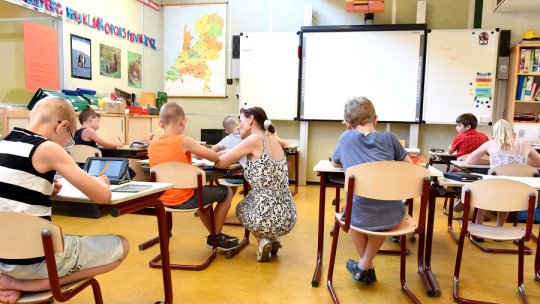
Education is one of the fundamental pillars for the development of young people, offering them valuable and necessary tools to face different life challenges. However, sometimes some students face the difficulty of repeating a school year. This experience often generates concern in both parents and students themselves, and the general response is usually punishment or a negative assessment of these situations.
Therefore, If the social evaluation of repeating a school year is so negative, what impact does this have on the self-esteem of those who are affected by this? In this article, we will comment on the impact on self-esteem and mental health of repeating a school year, in addition to proposing strategies to control these very negative thoughts or feelings and promote awareness that repeating a year should not be classified as something negative.
Why is a school year repeated?
Grade repetition can be caused by different factors. Among them, we can find persistent academic difficulties, lack of adaptation to the pace of learning or personal problems that affect the pace of school. In most cases, course repetition can be considered necessary to ensure a solid foundation of knowledge, especially if moving to the next course without having established this prior knowledge will result in a worsening of the student’s performance and behavior.
We are going to discuss in more depth some causes of the repetition of a school year:
1. Persistent academic difficulties
Difficulties in understanding and assimilating concepts can lead to poor academic performance and, ultimately, to grade repetition as the skills and knowledge requirements to advance to the next grade are not met.
2. Lack of adaptation to the pace of learning
Each student has a unique learning pace. This means that some may need more time to assimilate information and develop skills, while the school curriculum can progress at a standard pace. This lack of adaptation to the learning pace can result in a gap between the student and the course content
3. Personal problems
External factors, such as family problems, illnesses, or traumatic situations, can interfere with a student’s academic performance. These personal problems can affect your ability to concentrate, actively participate in class, and complete required assignments.
What are the consequences of repeating a school year?
Repeating a school year can be a complicated process, which involves adapting to a new situation. This can be a stressful process, having to repeat the content of a school year, face new social relationships, new teachers, and carry the social label of being “the repeater”, which can affect the self-esteem.
The consequences are variable from one student to another, depending on their personality, emotional and social support and the strategies carried out to mitigate the negative effects of repeating a grade Here we propose some possible consequences of repeating a course:
1. Decreased self-esteem
Repetition of a course can generate feelings of failure and decreased self-esteem in students. Comparison with their advancing peers can make them feel less capable and valuable, which can affect their self-confidence and perception of their own academic success.
2. Stigmatization and social isolation
Students who repeat a grade may face stigmatization from their peers and even from teachers, which can lead to feelings of exclusion and social isolation. It is very important that the teaching team pays special attention to these behaviors to promote the adaptation of these students.
3. Impact on motivation towards learning
Repetition of a course can have a negative impact on students’ motivation and attitude towards learning. They may experience a decrease in their interest in school and studying, which can make it difficult for them to actively participate and engage in the educational process.
4. Higher risk of dropping out of school
Repetition of a grade may increase the risk of dropping out of school for some students. The frustration and demotivation associated with repetition can lead them to question their academic worth and to consider abandoning his studies.
The psychological impact of repeating a grade
As we have mentioned, the psychological factor can be greatly affected by repeating a course, endangering the psychological well-being of these students and their self-esteem. It is essential to recognize and address the psychological impact of grade retention on students.
Providing emotional support, fostering an environment of respect and understanding, and providing opportunities to rebuild self-esteem and self-confidence can help mitigate negative effects and promote positive emotional recovery.
Below, we will explore in more detail some of these psychological effects associated with this situation:
1. Feelings of failure
For many students, repeating a course can be perceived as an indicator of failure. They may experience a feeling of not living up to academic expectations or feel like they have let down their parents, teachers, or themselves. These feelings of failure can undermine self-confidence and self-esteem.
2. Shame and stigmatization
Retention can lead to feelings of shame, as students may believe they will be judged or stigmatized by their peers and other members of the school community. Fear of social stigma can cause a decrease in active participation in class avoidance of social situations and a sense of isolation.
3. Low self-esteem
Repetition of a course can negatively affect students’ self-esteem. They may begin to question their academic skills and abilities, which can lead to decreased self-confidence. Low self-esteem can affect your motivation, your attitude toward learning, and your ability to face future challenges.
4. Anxiety and stress
Repetition of a course can generate anxiety and stress in students. They may worry about their future academic performance, be afraid of facing the same obstacles again, or face pressure to catch up with their peers. This anxiety and stress can affect your concentration, your sleep, and your overall emotional well-being.
5. Loss of motivation
As previously presented, students who repeat a grade may experience a decrease in their motivation to learn They may lose interest in school activities, feel like they have no clear goals, or question the relevance of their education. This loss of motivation can hinder their academic progress and their commitment to the learning process.
Strategies to mitigate the effect of repeating a grade
To conclude this article, we are going to discuss different strategies that can help mitigate the negative effects of grade repetition on students. When implementing these strategies, it is important to adapt them to the individual needs of each student and work collaboratively with parents, teachers, and other educational professionals to provide comprehensive support. Each student is unique and will require personalized approaches.
1. Provide emotional support
It is essential to offer an environment of support and understanding to students who have repeated a year Parents, family members, and teachers can play a key role by actively listening to students, validating their feelings and concerns, and providing them with the emotional support necessary to overcome this experience. Showing them that their value as individuals is not based solely on academic performance can help them rebuild their self-esteem.
2. Focus on achievements and strengths
Highlighting students’ achievements and strengths, no matter how small, can help them rebuild their self-confidence. Recognizing your progress and effort, even in areas that are not directly related to academic performance, can foster a positive attitude toward learning and strengthen your self-esteem.
3. Foster a growth mindset
Helping students adopt a growth mindset can be beneficial. Instead of focusing solely on past mistakes, it is important to emphasize that repeating a grade can be an opportunity to learn and grow. Encouraging them to see challenges as opportunities for improvement and to set realistic, achievable goals can increase their motivation and sense of self-efficacy.
4. Promote peer support
Encouraging the creation of support networks among students who have repeated a grade can be beneficial, in addition to encouraging their contact with other non-retaining students in the classroom. Organize activities or discussion groups in which they can share their experiences, challenges and successes It can help you feel less alone and find mutual support. Furthermore, this can contribute to building positive social relationships and reducing feelings of stigmatization.
5. Offer tutoring and additional academic support
Providing tutoring opportunities and additional academic support can help students catch up and strengthen their confidence in their academic abilities. Tutoring programs, whether through teachers, peers, or outside educational programs, can offer a safe space to address academic difficulties and receive personalized guidance.
6. Emphasize the importance of effort and perseverance
It is essential to convey to students that academic success is not defined solely by grades or performance in a specific course. Emphasizing the value of effort, perseverance, and personal growth can help them maintain a positive attitude toward learning and overcome obstacles in their path.








